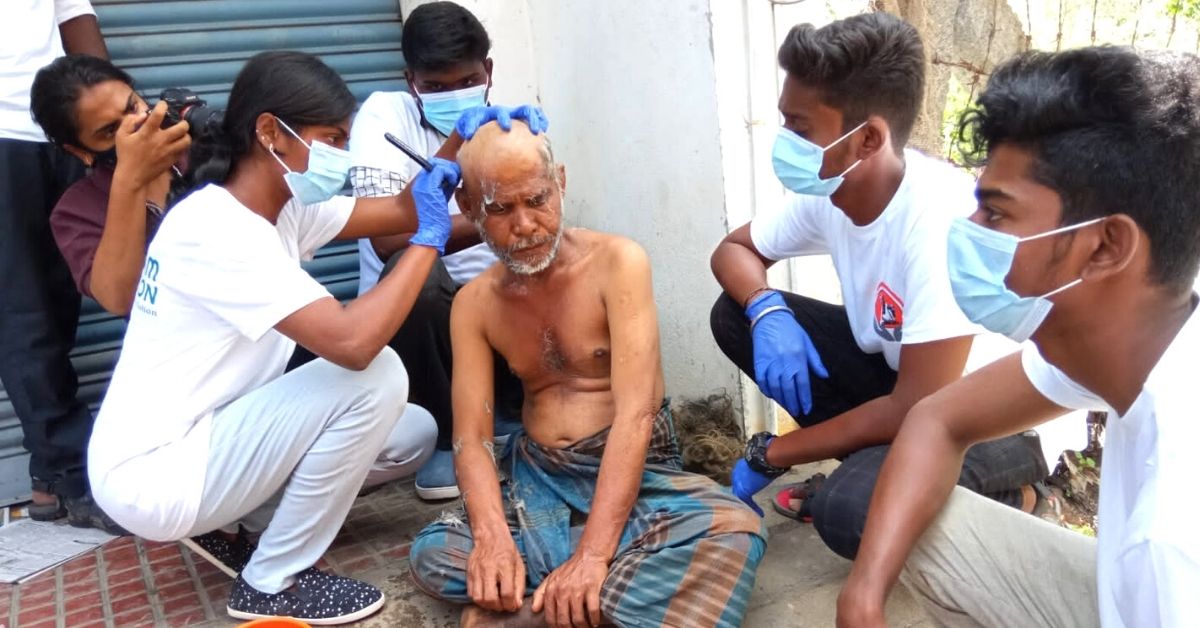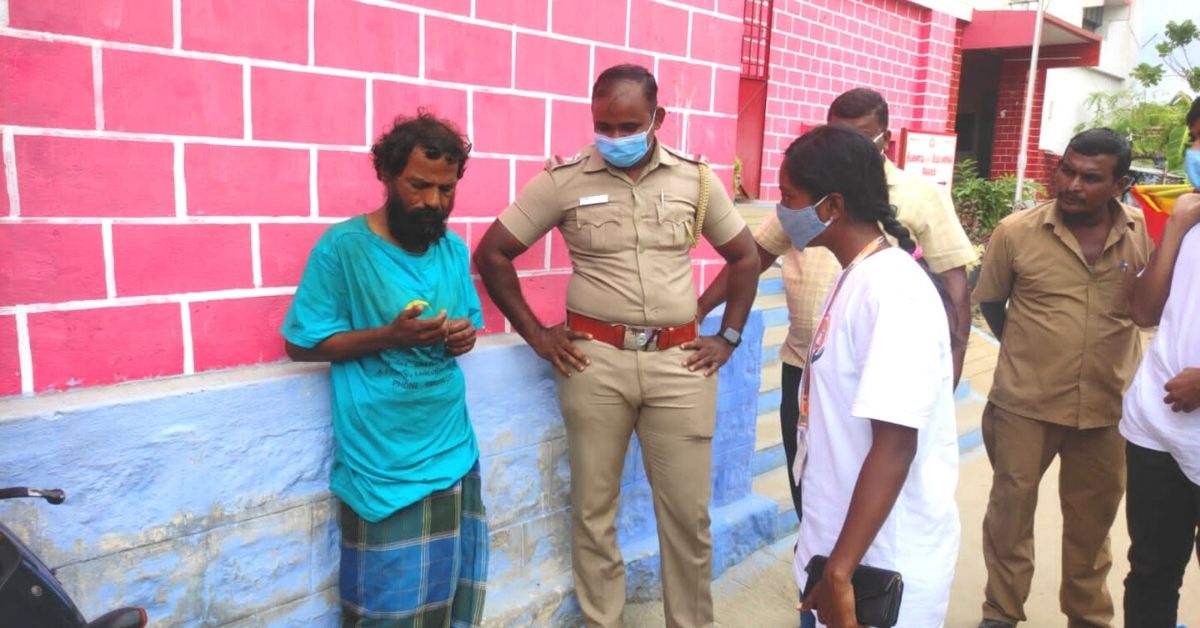Manisha Krishnasamy was born to a lower-middle-class family in Erode city of Tamil Nadu, where her father was a butcher, and her mother took care of their home.
Since childhood, she could never turn a blind eye towards the plight of street-dwellers, beggars, homeless and other lone souls struggling to live on the streets. To show sympathy and offer help, Manisha worked part-time at her father’s butcher shop and spent her earnings feeding the roadside dwellers.
As she grew up, she always aspired to join the Indian Army or become a doctor. However, when the time came, Manisha learned that her dreams could never translate into reality due to their poor financial conditions.
Over the years she managed to graduate as a nursing professional from JKK Nattraja Educational Institution in 2017. Soon, she started working as a lecturer at Nandha College of Nursing, but the sight of suffering street dwellers continued to pain her.
“I started spending my earnings to help the street-dwellers. However, on my way to college, I occasionally saw an elderly roadside dweller walking with a stick. When I tried to talk to him, he hesitated. I tried to offer him food, but the people around him warned me about his aggressive behaviour,” she tells The Better India.

Over the next few days, Manisha realised that the person spoke Malayalam while she spoke Tamil, but she continued trying to develop a connection and somehow overcome the language barrier with the help of people around. Later she convinced him to rehabilitate at the Villupuram Anbu Jothi Ashram.
Since then, the 24-year-old has rehabilitated hundreds of people from various corners of the city and even assisted them in getting employed.
Befriending The Homeless
“Helping such people made me realise that besides sympathy, they need empathy as well,” she says, adding that she started identifying more needy individuals on the roads.
Manisha says that she soon joined an NGO that was working for the cause. “I felt that rather than putting individual efforts, joining a set of people with the same motive could help achieve a bigger impact,” she adds.
However, within months she faced gender bias and opted out. “The members did not encourage me to go out on the field because I am a woman. They were less supportive. So, I quit working at the NGO in 2018 and decided to work alone,” she says.
The same year, Manisha registered her NGO, Jeevitham Foundation, to work for the cause. Explaining her approach, she explains, “I identify street-dwellers in different parts of the city and outskirts but never talk with them directly at the first instance. The street dwellers usually do not move away from their location. So, small eateries, joints, street vendors and locals know about them.”
Manisha says that she collects information about the person from everyone in their vicinity. “I ask about how the person came to the place, the time duration since the person is living, and behavioural patterns and particular physical or mental illnesses they suffer from. I also check on their dietary patterns and consult on other aspects such as addictions. I visit the place almost daily so that the person becomes familiar with my presence,” she explains.
She says after feeling confident, she approaches the person with food and tries to communicate with them. “When I connect with the person, I try to befriend them by inquiring about them, their family and seek other personal details. Once they are willing to share their issues, I give them a bath, medicines, food and other requirements that they need,” she adds.
After a few days, she suggests they move to a government shelter home. “If they have a family who abandoned them, I speak to the members requesting to accept their relatives back to them. Many families do accept their loved ones, while others move to the shelter home,” she says.

Manisha says she further helps people get rid of addictions with the help of doctors. “Sometimes they show aggressive behaviour and can even become violent or bite. Hence, it is important to make them feel comfortable, show genuine care and then approach them. I take the help of volunteers to talk and convince the roadside dwellers too,” she says.
She adds that the entire process from connecting to rehabilitating them can take a week or a month. “I do not have a private space or shelter, and hence the street-dwellers continue to live where they are under care until rehabilitation arrangements fall in place,” she says.
Manisha also takes help from the local police for the cause.
P Vetrivel sub-inspector, at Veppadai police station, says, “I met Manisha during a rescue work when she was working with a previous NGO. The roadside dwellers or homeless cannot move to shelter homes without permissions, and I issue the required request letters permitting the same.”
Vetrivel adds that he often informs Manisha of persons on the street needing help. “I also arrange for a cab or provide vehicles to move the street-dwellers or sometimes give money, if needed,” he says.
But the COVID-19 pandemic put a sudden halt to her philanthropy “I could not move out or reach the needy. Moreover, the street dwellers became more vulnerable to the situation. Hence, I requested the civic body officials to seek a place for sheltering them. The officials agreed to make a temporary arrangement in a school,” Manisha says.
With a safe place for the street-dwellers, Manisha started providing them with healthy food, medical care and exercise such as yoga. “Their bodies and minds relax with food and exercise, and they show a willingness to help me. Some work in the community kitchen, while others clean the premises and arrange for other requirements. Apart from the 17 volunteers working for the NGO, there is no one to assist them. They have slowly become independent,” she says.
Manisha also organised vocational training courses in cooking, knitting and other skills to help the street-dwellers become gainfully employed.
So far, she has rehabilitated over 340 people and given jobs to 54 others, making them financially independent.
‘My Only Relative’

Ramesh is one of the many whom Manisha rehabilitated. He says, “Manisha took care of me the same way a mother does. I was begging for food and did not earn money after my mother passed away due to an illness. I had no support from any relatives. Eventually, I became addicted to alcohol and started living on the streets.”
He adds that Manisha approached him at the beginning of 2021 to provide food and shelter. “I attended a power loom course organised by her and got a job. Today, I earn Rs 1,000 per day and live in a rented room. I bought a new cell phone a couple of days ago with my salary and made my first call to Manisha. I will be forever grateful to her. She is my only relative in this world, and I have requested her to talk to me at least once a week over the phone and visit me once a month,” Ramesh says.
Manisha says that though she finds satisfaction in helping the needy, much of her work slows down because of financial constraints.
“I try to help with the available donations that the NGO receives. Often, I spend my salary but on some days, we need to travel long distances and need a vehicle to rescue people too. On many occasions, we keep postponing our plans to move street-dwellers to the shelter homes as there is no vehicle or funds to carry out the task,” she adds.
“It would be a massive help if someone can donate us a vehicle for street dwellers,” she says. Moreover, Manisha has a message for people who wish to help the needy: “If people wish to help the poor on the roadside, kindly give them food, clothes or anything. If they are unable to afford any items, offer them a smile. Never offer money, as they can become addicted to many habits like alcoholism or substance abuse,” she says.
If you wish to support Manisha, donate to the following details.
Name: Jeevitham Foundation
A/C: 1619135000027926
IFSC code: KVBL0001619
Bank: Karur Vysya Bank
Or
Google pay & Paytm at 6379965074
Edited by Yoshita Rao
No comments:
Post a Comment